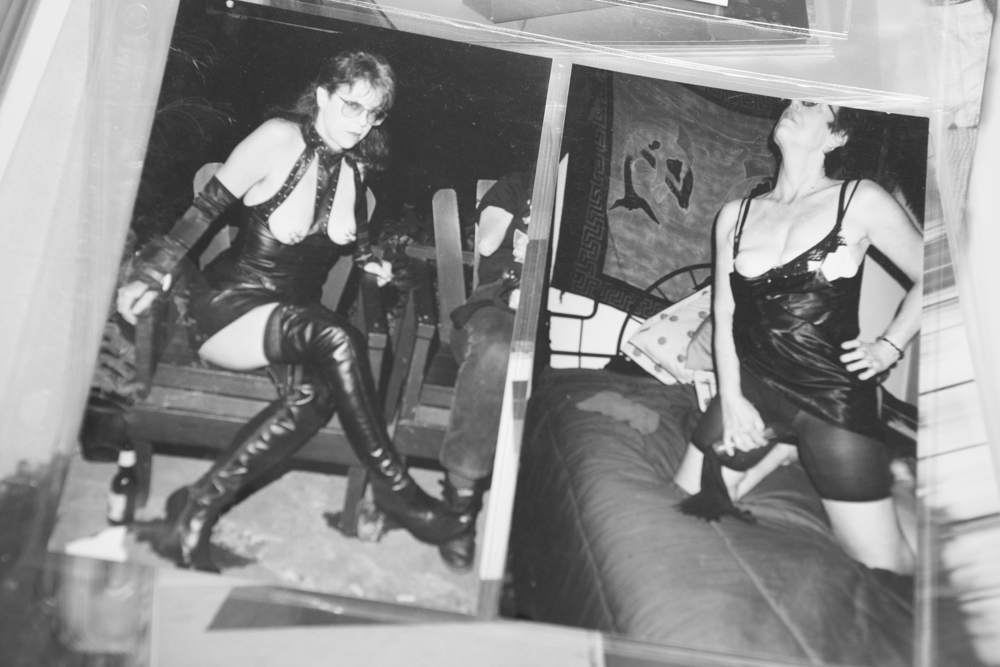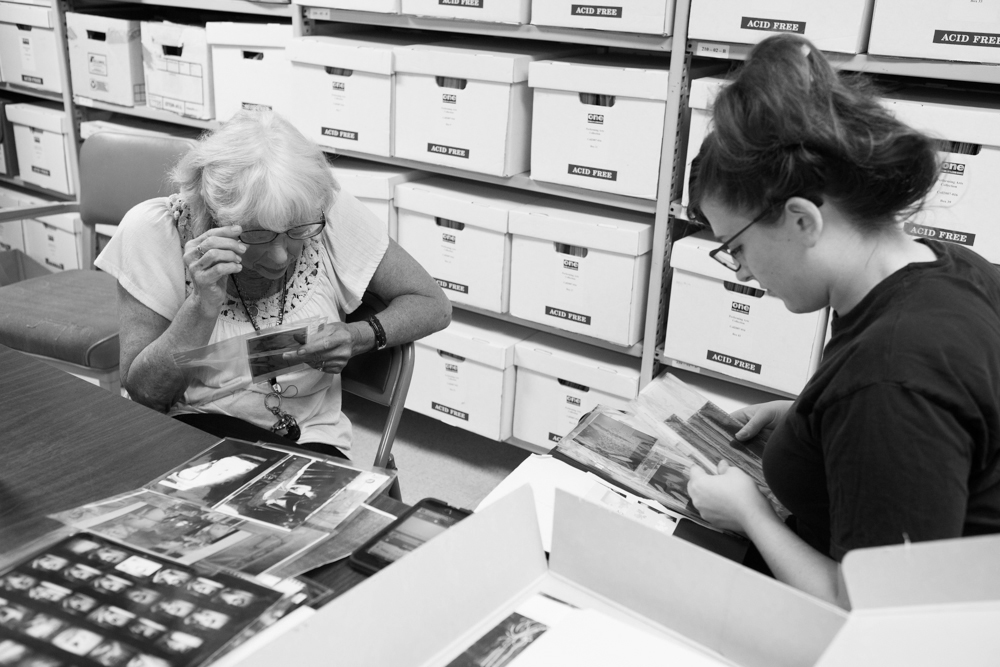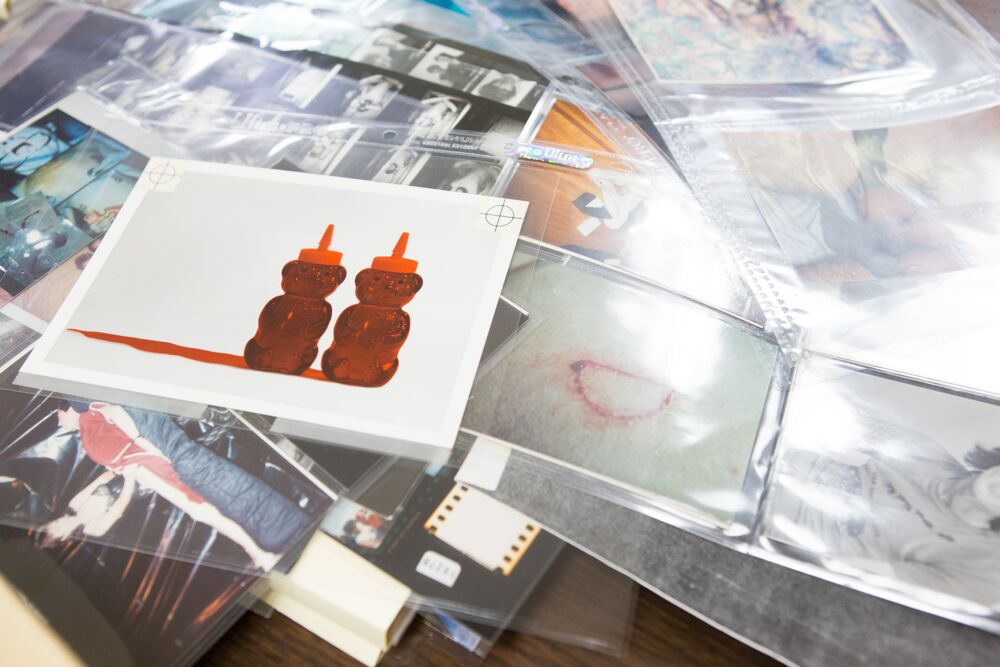text by Audra Wist
Something about returning to my hometown of Pittsburgh always makes me really horny. One night, after Tinder-ing for awhile I came across a dude named Ed - profile picture was slick and mysterious, black and white, him in a Gucci bucket hat, sunglasses, and a Public Enemy hoodie. Swiped right. This was not a typical Pittsburgh guy. Why not? The mystery man with great style turned out to be Ed Piskor. We matched and met up that night. He answered the door in his pajamas which I thought was funny given our assumed future activities and we proceeded to give each other little gifts. I gave him a copy of the Autre LOVE issue and he gave me an old issue of FOX magazine where one of early comics was in, super babe Janine Lindemulder was on the cover (the iconic tattooed nurse blondie on Blink-182’s Enema of the State album cover). Yeah, I liked Ed already. He is a Pittsburgher to his core and wildly successful, his new series Hip Hop Family Tree earning him three Eisner Award nominations and numerous other accolades and shout-outs from hip hop greats like DJ Ready Red and DMC as well as TIME and Boing Boing. His comic heavyweight status aside, I wanted to talk with him about sex because of his early involvement in porno mags and because during our evening rendezvous, he was incredibly sexy: kind, funny, unafraid - a real cool guy. He was on, fully himself, but no fluff or pretension. I would agree with Ms. Lehoczky at NPR who wrote about Ed’s work saying “he’s more realer without even trying.”
Audra Wist: I wanted to open with the fact that we met on Tinder and we had this deep love for old things, like newsstand stuff - erotica, comics, music, magazines, records - print media. I liked you from gate because of that. You were involved in both porn and print media. And you did “Eddie P’s Calvacade of Perversion,” right?
Ed Piskor: Yeah.
Wist: How long did you do that with that magazine? Or why porn, in general?
Piskor: When I was underage I was commissioned to do illustrations in porn mags. They never asked my name. I had this reputation that got started, a lot of people thought I was a grizzled old hippie because the style was influenced by Bay Area underground comics of the 60s. And at that time, Robert Crumb was my biggest influence ever. So, in conversation when they found out I was 17 it was big trouble. From there, very randomly, this lady who has had this whole career in copywriting porn mags - she wrote for the Berkeley Barb and worked for different porno mags based out of SF. She put together a comic just about her life and career and she commissioned maybe 5 guys and girls to illustrate her stories, so I did that. And from there, she was the connection to FOX magazine and other weird porn related stuff. I didn’t do that many strips - I did maybe a handful. A couple years later, I did one panel of cartoons for Belladonna on her website. And I did that for a couple months and it yielded 60 or 90 different cartoons. It was super fun to begin with but after awhile it got real redundant because she’s really well-known for taking different instruments into her ass.
Wist: Right, yes, I remember you saying that you ran out of stuff to put in her butt.
Piskor: Yeah, it’s the truth. I couldn’t think of anything else. I could be remembering this wrong, but I’m pretty sure I drew a cartoon with the kitchen sink in her ass and that was the joke of it.
Wist: I really love that.
Piskor: So ridiculous. And you have to think too, this was a 23-year-old boy making these things. My own sexuality was pretty immature which lends well to doing humorist stuff because a young person’s sexuality is nothing but folly for years. You gotta get your 10,000 hours of experience in fuckin’ before it’s no joke anymore.
Wist: It’s so true! That’s why I try not to fuck around with anyone under the age of 28. That’s my cutoff. Otherwise, it gets dismal. Have more sexual experiences! The more the better.
Piskor: Certainly, I agree. And as creative people, our lives are sorta built on experience. Your work will become tremendously uninteresting, an insular vision, if it doesn’t get expanded upon by outside sources. A lot of art is about the decisions that you make and sometimes you need weird stuff put in your path and figure out how to navigate around that stuff to learn about yourself.
Wist: And speaking to creative people, I find that if you are unapologetic in your work that it has to translate over to how you are in bed, right? One of the things that struck me about you was how open, comfortable, and non-judgmental you were about talking about sex, which is rare to me even though it’s my bag.
Piskor: Is it a question about being non-judgmental?
Wist: No, I guess I’m asking if you agree that there is a connection between how people conduct their sex lives and the quality of their work.
Piskor: In our case, we did not know each other very long, so I had to let you know that it was a cozy situation. I mean seriously, at any moment, if you ain’t feeling shit, there would absolutely be no hard feelings. Things are all good. And if you’re comfortable in your mind and I’m comfortable in my mind, then we’re probably going to have a pretty awesome time.
Wist: It’s so fucking true. And this whole pick-up artist thing and “negging” - have you heard about this?
Piskor: Oh, yeah. You know, after I did the porno stuff I did a book about computer hacking [Wizzywig] and a big part of computer hacking is something called “social engineering” which is the idea of verbally getting what you need from others. It’s way faster for me to talk to you and get you to give me your password then it is for me to use some computer code to get it. So, a subset of this social engineering thing is that pick-up artist stuff. I saw this stuff in the 90s. All the dudes that are famous now were on hacker bulletin boards when I was in high school. So, yes, I am familiar but I do not employ it. I just can’t put that much thought into it. These dudes are fully invested.
Wist: I’m now thinking about some of the people you were interested in growing up like R. Crumb and you worked with Harvey Pekar, kind of sexual stuff, when you were pretty young, right?
Piskor: Yeah, 21.
Wist: Were they formative for you, maybe not just in thinking about sex, but formative for you in talking openly and being a confident person? R. Crumb seems like the binder of sex, outlandishness, grotesque, honest - all those things.
Piskor: Yeah, he was a big motivator for me, the idea of being real. Another big influence would be John Waters. I’m a big devotee of his films.
Wist: I was going to ask you that, but I think we talked about him before.
Piskor: Yeah, and it’s about being unapologetic in your tastes which is becoming exceedingly rare because people do filter things through different kinds of social lenses. You have to develop a certain sophistication of taste to understand it. Like if you’re knee-jerk about it, then it’s hopeless. We don’t even need to have that debate. You’re going to see things one way and be resistant to opening up your mind more. So, yeah, Crumb… John Waters, Hugh Hefner, Russ Meyer. And then you get into Richard Kern, Lydia Lunch.
Wist: Yeah, I’m a big fan of Lydia Lunch. I got to perform with her this past February and she was great.
Piskor: Oh cool, what for?
Wist: Actually, for this magazine. It was the release party. And I didn’t know she was going to be on the bill until a couple days beforehand and she’s obviously an influence. I read this eleven-page document on sexiness, kinda cutting and charged and so I got really nervous, like oh fuck, what if Lydia Lunch thinks I’m copping her shit. I had all these weird fantasies about her hating me and then I was just like wait, that’s what it’s all about.
Piskor: It’s always scary. I’m very resistant to meeting my heroes because I would be heartbroken if they treated me like an asshole. That’d be a tough pill. So, I stay aloof. The best-case scenario would be if they came to say hi to me. It changes the dynamic.
Wist: Yeah, I remember emailing Kembra Pfahler of The Voluptuous Horror of Karen Black gushing to her how I thought she was so great and she said something so profound, she said “if and when we ever meet, you will be pleasantly disappointed to find out that I’m exactly like you.” I thought that was fucking genius. Can you talk a bit about your education as an artist?
Piskor: I went to art school for one year and then I was like oh, I have to pay these student loans back? I immediately got this square job at a call center and all of my superiors were such dumb people that it made me sick every day. And I was like okay man, I just gotta make a bunch of cash, put it all towards these loans and get the hell outta here.
Wist: The same thing happened to me after undergrad. I was doing domme already but still a little uncertain about it being kind of a lone wolf in Pittsburgh, and so I got this job at this floral warehouse down in the strip district to make ends meet. I woke up at like 4AM to go work with a bunch of yinzer dudes. Imagine that scene. It was fucked up. They said stupid shit to me. I learned a lot about flowers which was cool, but it was bad. And one day I was just like fuck this forever.
Piskor: As a creative person, you have to make that call. You have to be able to gamble on yourself at a certain point. You gotta gamble on yourself when you’re younger because you have a lot of fire, a lot of energy at your disposal so you can work on things all day if it’s required. You have to make that call. It’ll make you happier in the long run. At least you took the shot.
Wist: I was gonna ask you this and it’s maybe a bit of a tangential question and also selfish of me because I have very nostalgic romantic feelings about Pittsburgh but you're arguably the most successful creative person from Pittsburgh other than maybe Wiz Khalifa. So, why did you stay in Pittsburgh? It seems to fit in with that hacker mentality you mentioned with Wizzywig.
Piskor: I have a young sister who is fifteen who I adore and I want to be a good role model for. I have a niece who’s a little baby. If they hated me or something, I would leave tomorrow. But also, there is a hacker element to it because it’s so cheap to live here. I make Los Angeles money or New York money and I live in a place that has a way cheaper cost of living. I can live real nice and comfortable. In order for me to do the kind of work that I do, it takes a lot of time and time is money. My biggest stressors are purely self-induced because it’s about the work. Comics are like a puzzle: you try to figure out the best way to accomplish this puzzle and create each page and I’m very hard on myself, as most self-employed are. You have to be objective and tough on yourself because no one else is going to. No one is forcing you to do what you do. So, you have to be on top of your game. And if you had that plus rent or a mortgage or whatever, I’m not sure if you could do the best work.
Wist: I want to talk about Hip Hop Family Tree. First of all, congratulations - it’s so successful and you were just nominated for three Eisner awards.
Piskor: Yeah, yeah, thank you. It’s a cool thing, I can’t deny it. Back in 2015, it was my New Year’s Resolution to accept compliments. So, thank you very much. I think the big goal is to make enough cash to see a head shrinker and take care of some of those sticking points. Like Ed, man, you can relax. You might shave a couple years off your life if you’d stop being such an intense motherfucker. Help me address my intellectual small penis complex or whatever.
Wist: You are the best. You’re like a contemporary feminist icon, poster boy, at least for me. It’s really great to hear you say all these things.
Piskor: I didn’t say it in the context of us being butt naked, but I was thinking we’ll probably be cool forever. Like I don’t doubt that we’ll be like 50 years old and I’ll be out in LA and we’ll be kicking it. Why would that not happen? You have to nurture those kinds of personalities that operate at that level. Everyone I try to be around is operating at a pretty intense level and our vocations are different but there are abstract ideas that can be used for my own shit, maybe for your own shit, and it increases the breadth of possibility just as a person. I definitely don’t doubt that we’ll be homies for the foreseeable future. It’s very nice - a pleasure to meet ya! And I’m super proud to be a notch on your belt.
Wist: You are sweet. And now you have this great sell for future women! You can say look, I’m such a great lay, look at this girl who fucked me and had all this nice stuff to say about it.
Piskor: Audra, if you keep saying it, I’m gonna believe it.
Ed Piskor's Hip Hop Family Tree Hip Hop Family Tree 1983-1985 Gift Box Set is available now. Text, interview and photographs by Audra Wist. This interview has been condensed and edited. Follow Autre on Instagram: @AUTREMAGAZINE











